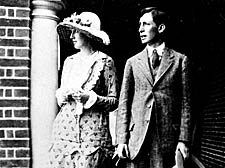
Virginia and Leonard Woolf |
Who’s ever heard of Mr Virginia Woolf?
It’s about time Leonard Woolf walked out of the shadow of his brilliant but troubled wife, writes Piers Plowright
LEONARD WOOLF by Victoria Glendinning, Simon and Schuster, £25
order this book
THE only time I met the famous art critic Kenneth Clark (Lord Clark of Civilisation), he told me that for him there were two really outstanding figures in the Bloomsbury Circle: one was the poet and translator Arthur Waley and the other was Virginia Woolf. He didn’t mention Leonard Woolf, but then nobody did. Perhaps they will now.
This long, detailed, and meticulously researched biography brings out of the shadows a remarkable man who deserves to be known for far more than being the husband of his brilliant and unstable wife. Though the relationship was, of course, central.
Virginia was the ideal woman Leonard was searching for in his awkward days at Trinity College, Cambridge, and his uncomfortable years as a colonial administrator in then Ceylon. She was also the ghost that haunted him till his death in 1969.
They were married in 1912, while Leonard was on leave from Ceylon and he devoted his life to her until her suicide in the River Ouse nearly 30 years later.
Shortly before her death Virginia wrote him a note which expressed exactly what she owed to that devotion.
It ended: “If anybody could have saved me it would have been you. Everything has gone from me but the certainty of your goodness. I can’t go on spoiling your life any longer. I don’t think any two people could have been happier than we have been.”
Born into a comfortably off Jewish family in 1880, Leonard was a star pupil at St Paul’s School, surviving its ferocious anti-semitism mainly through his skill at games.
At Cambridge his academic promise more or less fizzled-out in the stimulating but distracting company of the dissolute Lytton Strachey, the philosopher GE Moore and the good-natured Thoby Stephen, Virginia’s older brother.
That was how Leonard first met her, with her sister Vanessa, at tea in Thoby’s rooms, in 1903.
Nothing at first happened and he was still a virgin when he set off for Ceylon the next year at the age of 24. There, as a reluctant member of the colonial establishment, he saw and supervised things that shot him brutally up the ladder of experience: hangings, floggings, religious and matrimonial disputes, and the consequences of disease.
For Virginia, when they met again in 1911, he had, in Victoria Glendinning’s phrase, the kind of glamour that Othello had for Desdemona. Except that Leonard was about as far from Othello in temperament as it’s possible to imagine.
Coping with Virginia’s breakdowns which began almost as soon as they were married, with her extraordinary sensitivity about her own work and reactions to it, and with the consequences of her death, while continuing to write, publish, debate and organise – he founded the Hogarth Press with Virginia and was active in early Labour politics.
His motto – the same as TE Lawrence’s, by the way – was ‘Nothing Matters’. In fact, everything did, and what this biography brings out sharply is the passion and energy he managed to save for his novels, pamphlets, campaigns and friendships.
Glendinning tells for the first time the full story of his long and largely happy relationship with the painter Trekkie Parsons, whose cheerful, practical and open nature provided the oasis of peace the shell-shocked Leonard was looking for.
Trekkie kept her own marriage and, though the strain of a double life sometimes showed, she was always there when Leonard needed her, up to the end.
Leonard Woolf had a long and complicated life. His interests and connections spilled into politics, philosophy, literature, music and painting. He was a pivotal figure for pressure groups and reform movements, a councillor and friend to many.
Perhaps his greatest quality was a stubborn common sense. In spite of his politics – “a well known left-wing publicist” George Orwell called him – he could see both sides of most questions, defending British justice on a return visit to Ceylon and attacking Kingsley Martin’s dogmatic anti-Americanism while acting editor of the New Statesman in the late 1940s.
There was truth in Asa Briggs’ praise of him at the first degree ceremony of the new University of Sussex in 1964 – Leonard was made an Hon D.Litt – as a man ‘never flattered by authority and never seeking to flatter it’. And he was resolute in his refusal of the comforts of religion: ‘No, no, no, no!’ he cried out from his death-bed when a Catholic friend managed to sneak upstairs and say “Leonard, when you wake up, you’re going to have a wonderful surprise!”
His lawyer father had taught him that to live well a man need only follow the advice of the Prophet Micah: “…do justly…love mercy, and.. walk humbly with thy God.”
Leonard may not have had much time for the last bit, but he cared passionately about justice and mercy.
“They seem to me” he wrote, ‘the foundation of all civilised life and society, if you include under mercy, toleration. This is, of course, the semitic vision.”
As it was his.
|



